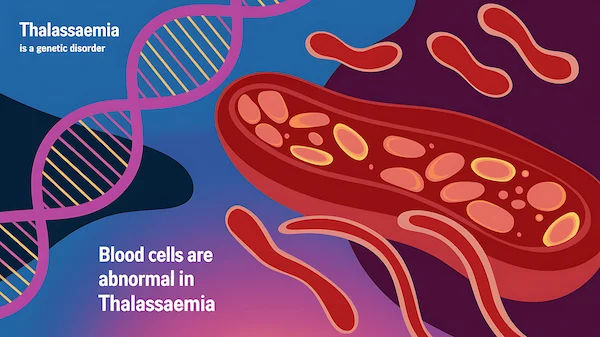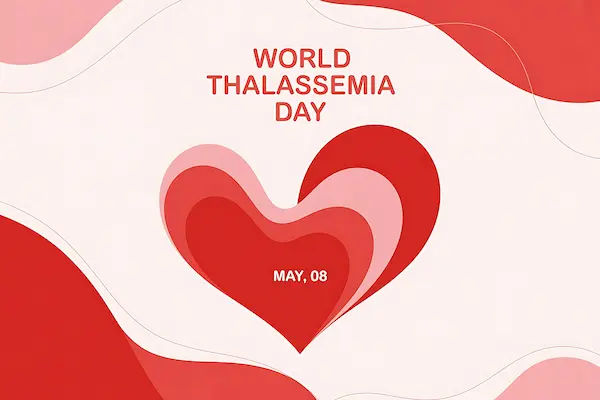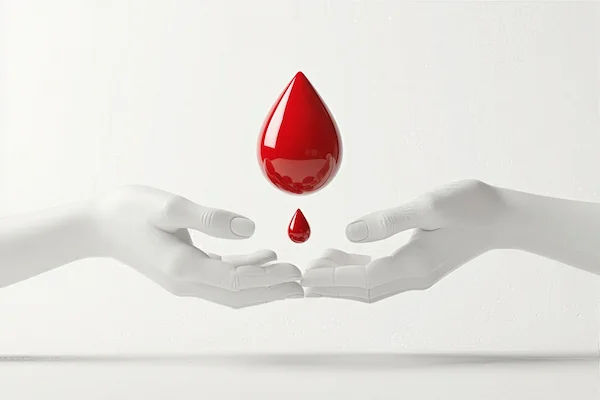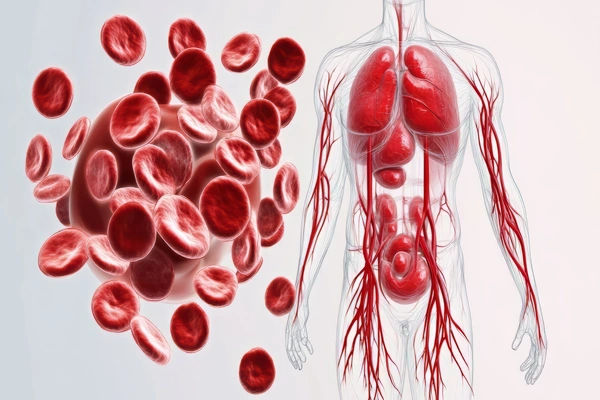Thalassaemia Screening A Crucial Step Before Marriage & Pregnancy
Discover why thalassaemia screening before marriage and pregnancy is vital. Learn about tests, results, options for carrier couples, and genetic counselling for a healthy family future.

Written by Dr. Siri Nallapu
Reviewed by Dr. Rohinipriyanka Pondugula MBBS
Last updated on 13th Jan, 2026
.webp?tr=q-80,f-webp,w-350,dpr-2,c-at_max 700w)
Introduction
Planning for marriage and a family is one of life's most exciting journeys, filled with dreams of a shared future. An essential part of this planning, often overlooked, is understanding the genetic health you and your partner may pass on to your children. Thalassaemia, an inherited blood disorder, is a prime example of a condition that can be managed with foresight and knowledge. This guide is your comprehensive resource on thalassaemia screening before marriage and pregnancy. We will walk you through what thalassaemia is, why genetic testing is a profound act of love and responsibility, the simple tests involved, and what your results mean for your family planning options. Taking this step empowers you with knowledge, turning potential worry into a clear, actionable path towards a healthy family.
What is Thalassaemia? Understanding the Genetic Basics
Thalassaemia is a group of inherited blood disorders characterised by less haemoglobin and fewer red blood cells in the body than normal. Haemoglobin is the protein in red blood cells that carries oxygen. This shortage leads to anaemia, leaving a person fatigued and short of breath.
There are two main types:
• Alpha Thalassaemia: Occurs when genes related to the alpha globin protein are missing or mutated.
• Beta Thalassaemia: Occurs when similar genes affect the beta globin protein. Beta thalassaemia is more common.
The severity of the disorder depends on how many genes are affected. A person can be a carrier (thalassaemia minor/trait), having one mutated gene, or have thalassaemia major (Cooley's anaemia), having two mutated genes, which is a severe condition requiring lifelong blood transfusions.
Why Screening Before Marriage is a Proactive Choice
The tradition of pre-marital health check-ups is evolving to include genetic screening, and for a powerful reason. Thalassaemia carrier detection before marriage is not about discouraging unions but about empowering couples with knowledge. It transforms family planning from a game of chance into an informed strategy.
• Informed Decision-Making: Couples who discover they are both carriers can enter marriage with a clear understanding of the genetic risks and the medical options available to them to have healthy children.
• Reduces Future Anxiety: Addressing this question early eliminates the stress and potential crisis that can arise if the discovery is made after a pregnancy is confirmed.
• A Foundation of Honesty and Trust: Discussing health and genetic compatibility fosters open communication about important life issues, strengthening the relationship's foundation.
The Critical Importance of Screening Before Pregnancy
If screening was not done before marriage, it becomes absolutely non-negotiable during pregnancy planning. The goal is to identify carrier status before conception.
• Time for Comprehensive Testing: If both partners are identified as carriers, it allows time for more detailed genetic testing and consultations with a haematologist or genetic counsellor.
• Exploring All Options: It provides the couple with the full spectrum of choices, including prenatal diagnostic tests like Chorionic Villus Sampling (CVS) or Amniocentesis to test the foetus, or considering assisted reproductive techniques like Preimplantation Genetic Diagnosis (PGD) alongside IVF.
• Prevents Surprise Diagnoses: Without screening, the first sign of a problem might be a severe anaemia diagnosis in a newborn, which is a much more challenging scenario to manage.
How is Thalassaemia Screening Done? The Tests Explained
The screening process is straightforward and involves simple blood tests.
1. Complete Blood Count (CBC): This is often the first test. It measures the size, number, and maturity of different blood cells. Individuals with thalassaemia trait often have microcytic (smaller than normal) and hypochromic (paler) red blood cells.
2. Haemoglobin Electrophoresis (Hb Electrophoresis): This is the definitive test for carrier detection. It separates the different types of haemoglobin in the blood. A carrier will have elevated levels of Haemoglobin A2 (>3.5%) and/or Haemoglobin F.
For convenience, Apollo24|7 offers home collection for these crucial tests, making the first step in your family health journey as easy as possible.
Interpreting Your Thalassaemia Test Results: What Does It Mean?
Result Scenario | What It Means | Implication for Children |
Both partners are NOT carriers | No mutated genes detected. | Risk is virtually zero. Your children will not have thalassaemia major, though they could be carriers. |
Only one partner is a carrier | One partner has a mutated gene, the other does not. | No risk of thalassaemia major. Each child has a 50% chance of being a carrier like the parent. |
Both partners are carriers | Both partners have one mutated gene each. | In every pregnancy: - 25% chance of a child with thalassaemia major. - 50% chance of a child who is a carrier. - 25% chance of a child without the gene. |
Options for Couples Where Both Partners are Carriers
Receiving news that you are both carriers can be daunting, but it is not a dead end. Modern medicine offers several paths to parenthood:
• Prenatal Diagnostic Testing: During pregnancy, procedures like Chorionic Villus Sampling (CVS) (at 11-14 weeks) or Amniocentesis (at 15-20 weeks) can collect cells from the placenta or amniotic fluid to test the foetus for thalassaemia. This allows parents to prepare medically and emotionally for the outcome.
• Preimplantation Genetic Diagnosis (PGD): This is an option with In Vitro Fertilisation (IVF). Embryos are created in a lab and tested for the thalassaemia gene before being implanted in the uterus. This allows for the selection of an embryo that is unaffected by thalassaemia major.
• Adoption or Using a Donor Egg/Sperm: Some couples may choose to explore these alternative paths to build their family.
The Role of Genetic Counselling in Your Journey
A genetic counsellor is an invaluable resource. They are trained professionals who:
• Explain the complex medical and genetic information in an understandable way.
• Discuss the emotional and psychological aspects of being a carrier and the associated risks.
• Outline all possible options without bias, helping you make a decision that aligns with your personal, cultural, and ethical beliefs.
• Provide support and connect you with relevant medical specialists.
If your screening results indicate you are a carrier, consulting a genetic counsellor is a highly recommended next step to navigate your options clearly.
Myths vs. Facts: Debunking Common Thalassaemia Misconceptions
• Myth: Thalassaemia is a disease that can be "caught" from someone.
Fact: It is an inherited genetic disorder, not an infectious disease. You cannot catch it from a blood transfusion or from being around someone who has it.
• Myth: If I have the thalassaemia trait, I will get sick.
Fact: Carriers are generally healthy and lead normal lives. They often do not have any symptoms or may have very mild anaemia.
• Myth: Thalassaemia only affects certain ethnicities.
Fact: While it is more prevalent in people of Mediterranean, South Asian, African, and Middle Eastern descent, it can occur in any ethnic group.
Conclusion: Knowledge is Your Greatest Ally
The decision to undergo thalassaemia screening before marriage and pregnancy is one of the most responsible choices a couple can make. It moves the narrative from fear of the unknown to empowerment through knowledge. This simple blood test can prevent immense future emotional and financial strain, ensuring that your journey into parenthood begins with confidence and clarity. Remember, being a carrier is common and is not a barrier to having a healthy family; it simply means you need a plan. Talk openly with your partner, consult your doctor, and take that first step. Your future family will thank you for it.
Have you and your partner discussed genetic screening? Share your thoughts or questions in the comments below. If you found this guide helpful, please share it to help spread awareness.
Consult a Hematologist for Personalised Advice
Consult a Hematologist for Personalised Advice

Dr Abilash Jain
General Physician/ Internal Medicine Specialist
12 Years • MBBS,DNB(FM),MNAMS,FIAMS,CCGMG(GERIATRICS),DGM (GERIATRICS),PGCD(DIABETES,BOSTON UNIVERSITY),FID(DIABETICS UK)CCEPC(PALLIATIVE CARE),CCCC(CRITICAL CARE)
Visakhapatnam
Apollo Clinic Vizag, Visakhapatnam

Dr. E Prabhakar Sastry
General Physician/ Internal Medicine Specialist
40 Years • MD(Internal Medicine)
Manikonda Jagir
Apollo Clinic, Manikonda, Manikonda Jagir
(150+ Patients)
Dr. Velu Nair
Haematologist
36 Years • MBBS, MD (Med.), FRCP, FACP, FAMS, FICP, FIACM, FUICC, FISHTM
Ahmedabad
Apollo Hospitals Gandhinagar, Ahmedabad
(25+ Patients)

Dr. Ramalinga Reddy
General Physician
5 Years • MBBS MD General medicine
Bengaluru
PRESTIGE SHANTHINIKETAN - SOCIETY CLINIC, Bengaluru

Dr. Prabu P
Haematologist
29 Years • MBBS, MD(Gen.Med.)(JIPMER) , MRCP, Dip RCPath, FRCPath, CCT(U.K), Haemato - Oncology.
Chennai
Apollo Hospitals Greams Road, Chennai
(550+ Patients)
Consult a Hematologist for Personalised Advice

Dr Abilash Jain
General Physician/ Internal Medicine Specialist
12 Years • MBBS,DNB(FM),MNAMS,FIAMS,CCGMG(GERIATRICS),DGM (GERIATRICS),PGCD(DIABETES,BOSTON UNIVERSITY),FID(DIABETICS UK)CCEPC(PALLIATIVE CARE),CCCC(CRITICAL CARE)
Visakhapatnam
Apollo Clinic Vizag, Visakhapatnam

Dr. E Prabhakar Sastry
General Physician/ Internal Medicine Specialist
40 Years • MD(Internal Medicine)
Manikonda Jagir
Apollo Clinic, Manikonda, Manikonda Jagir
(150+ Patients)
Dr. Velu Nair
Haematologist
36 Years • MBBS, MD (Med.), FRCP, FACP, FAMS, FICP, FIACM, FUICC, FISHTM
Ahmedabad
Apollo Hospitals Gandhinagar, Ahmedabad
(25+ Patients)

Dr. Ramalinga Reddy
General Physician
5 Years • MBBS MD General medicine
Bengaluru
PRESTIGE SHANTHINIKETAN - SOCIETY CLINIC, Bengaluru

Dr. Prabu P
Haematologist
29 Years • MBBS, MD(Gen.Med.)(JIPMER) , MRCP, Dip RCPath, FRCPath, CCT(U.K), Haemato - Oncology.
Chennai
Apollo Hospitals Greams Road, Chennai
(550+ Patients)
More articles from Thalassemia
Frequently Asked Questions
1. What is the cost of thalassaemia test before marriage?
The cost can vary depending on the city and lab, but a basic screening package including CBC and Haemoglobin Electrophoresis is generally affordable, often ranging from ₹1000 to ₹2500. It is a small investment for lifelong peace of mind.
2. Can two thalassaemia minor patients get married?
Yes, they can legally and socially get married. However, they must be aware that there is a significant (25%) risk in each pregnancy of having a child with thalassaemia major. They should seek genetic counselling before planning a family to understand all their options for having healthy children.
3. How to prevent thalassaemia in pregnancy?
The prevention happens before pregnancy through carrier screening. If both partners are identified as carriers, they can opt for Preimplantation Genetic Diagnosis (PGD) with IVF to select an unaffected embryo. If already pregnant, they can undergo prenatal diagnosis to know the foetus's status and make informed decisions.
4. Is thalassaemia test mandatory for marriage?
In India, it is not universally mandatory by law, but some states have advocacy programmes. However, from a medical and ethical standpoint, it is highly recommended for all couples, especially in high-prevalence communities.
5. Can a thalassaemia minor person have a normal delivery?
Yes, absolutely. Being a thalassaemia carrier does not typically affect your ability to carry a pregnancy or have a normal vaginal delivery. Your obstetrician will manage your pregnancy like any other, though they may monitor your anaemia levels more closely.
.webp)



